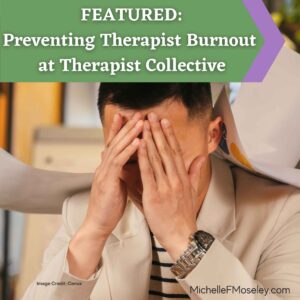Therapist Burnout is a common topic among those who work in the mental health field. We often find ourselves in positions of offering support and care to others. The personal characteristics that draw us to our work as therapists often mean that we see the needs of others all around us and may struggle to care for our needs. This pattern over time can lead to burnout – the experience of emotional, physical, and mental exhaustion that often comes from prolonged periods of stress or high-demand work.

Josh Kellar, the founder of Therapist Collective, recently invited me to write about the three types of relationships I have found integral in preventing therapist burnout. The following is an excerpt from my post:
“Therapists often find ourselves frequently giving to others. This makes it easy to start feeling burnt out. It’s likely that you often talk about the importance of supportive relationships with clients. You may even find yourself regularly assessing for protective factors in discussions with clients.
But what about you? Do you have supportive relationships that help protect you from therapist burnout?”
-From “Preventing Therapist Burnout” on Therapist Collective
Head on over to the full post to read more about the three relationships I have found important in combatting therapist bunout.
If you’re a therapist yourself, you may find the content at the Therapist Collective helpful. I encourage you to head over there and check out what’s available.
Michelle F. Moseley is a Licensed Mental Health Counselor in NC, and a Registered Telehealth Provider in FL. She believes ALL people deserve respect, compassion, and access to mental and physical healthcare. Michelle specializes in working with survivors of religious trauma and with those who have body image concerns, finding there is frequent overlap in these areas. You can learn more about Michelle by visiting her website at MichelleFMoseley.com or following her on Instagram – @therapy_with_michelle
